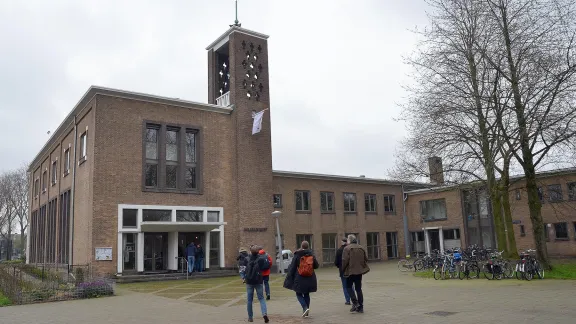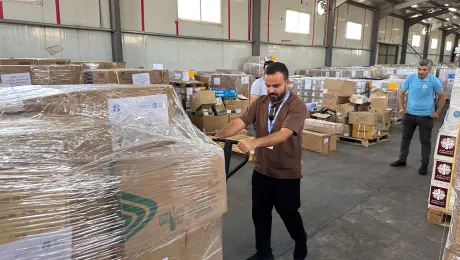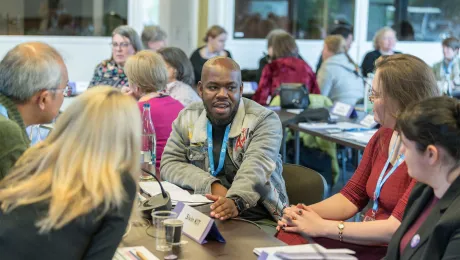
Participants in the "People on the Move" workshop visit the Augustanaho housing project and ecumenical center in Amsterdam. Photo: Holger Lux
‘People on the Move’ workshop showcases how community housing project responds to needs of changing population
(LWI) - Delegates representing member churches of The Lutheran World Federation (LWF) in Europe gained new insights when they visited a revitalized church, that that has been turned into a social housing complex, and an ecumenical center in a multicultural neighborhood of the Amsterdam.
The housing project is run by the Evangelical-Lutheran Diakonia Amsterdam, while the ecumenical church center is an initiative of local churches, including the Evangelical Lutheran Congregation in Amsterdam, supported by the Diakonia.
Five people each from the Central Eastern Europe, Central Western Europe and Nordic Countries regions took part in the 19-22 March visit, together with staff from the LWF and its partner organization, the International Academy for Diaconia and Social Action in Central and Eastern Europe (Interdiac).
Following on from the visits in Amsterdam, participants moved to a conference center in Doorn, east of Utrecht, for study and discussion on the theme, “People on the Move- Responding to Growing Diversity”. These three days of practical experience followed by group reflection marked the second workshop in a three-year process on conviviality, “the art and practice of living together”. The process is jointly organized by the LWF Europe desk and Interdiac to enable better cooperation of diaconal actors across Europe on “Seeking Conviviality”.
It showed us how vertical and horizontal thinking can be bridged, how reconciliation and peacemaking go together.
“It’s wonderful how economic and diaconal arguments can go hand-in-hand on an equal level”, Peter Szynka, a German delegate, commented after the experience. Hanne Wilzing, one of the Dutch participants added: “It showed us how vertical and horizontal thinking can be bridged, how reconciliation and peacemaking go together”.
“People need people”
“People on the Move” aims to deepen reflection on the impact of growing diversity across Europe that includes migration and social change, while strengthening the role of churches to respond and deal with such issues.
Delegates visited the ‘Augustanahof’, a new project of the Lutheran Diakonia in Amsterdam, located in the former Augustana church, built in the 1950s in the center of a green neighborhood.
After a long consultation on how to enable the structure to maintain a meaningful role in the community, the diaconal organization built 16 apartments for the social sector in the interior of the church building.
Under the motto “People need People”, most of the apartments are geared for the elderly, while some are also available for younger people. This mixture of age groups, and the obligation to look after each other as good neighbors, offers the elderly the possibility of independent living.
One apartment serves as a guesthouse for a young person learning to become independent, with the option of calling on other residents of the center for help when necessary. Everyone who is housed in the ‘Augustanahof’ is expected to participate in community activities.
The ‘Augustanahof’ also offers space for meditation and church services. The liturgical center, which includes the church’s stained-glass windows and a small garden for silent reflection, is open to the public as well.
“Step further”
“People on the Move” participants also visited ‘De Nieuwe Stad’ (the New City), an ecumenical center in the multicultural southeast part of Amsterdam, used by African Baptists, Lutherans (mainly from Surinam), Reformed, Roman Catholics, Indonesian Christians and the Presbyterian Church of Ghana.
It offers a joint program ‘Stap Verder’, (Step Further) that provides Dutch lessons for newcomers, and space for pastors to offer counselling on life, work, education, or immigration issues.
Participants in this second workshop in the “People on the Move” series were inspired by the many ways the church is responding to diversity in the local context. As a concrete result of the visit, they plan to publish a document outlining some of the newly developed terminology, including “diaconal ecclesiology” and “diaconal spirituality”.
Diaconal practice and experience from all over Europe will be shared, along with Bible Study materials connected to the projects and a toolkit offering guidelines for further conversation about diakonia.
The next workshop is due to be held in 2020 in the Nordic region.
By Praxedis Bouwman, edited by LWF Communications
The original report proposing Seeking Conviviality – a new core concept for diaconia.
Reflections and practice on welfare, work and economy are presented in this publication.
An evaluative report on the first stages of the Seeking Conviviality process, with reflections and recommendations are included in this document.


